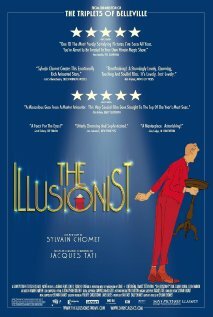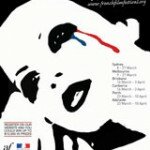So much is said in Sylvain Chomet’s bittersweet French animation The Illusionist, yet few words are ever spoken. The beautifully hand-drawn characters speak in a form of French gibberish, none of which is subtitled for English-speaking audiences, and none of which needs to be. Much like 2008’s similarly silent WALL-E, Chomet’s film understands that the human condition is a universal language, one that can be fully expressed through subtle mannerisms and character interactions.
Originally intended as a live action film, The Illusionist is based on a semi-autobiographical script written by French comic Jacques Tati, who died in 1982 before it could be produced. Set in 1959, the film follows the story of Tatischeff, a French magician with the likeness of Tati whose very occupation is becoming a vanishing act due to the rising popularity of rock n’ roll. Realising Paris has nothing left to offer him, Tatischeff travels to rural Scotland where he meets Alice, a young girl desperate escape her mundane existence. During his stay, the two quickly form a father/daughter bond and travel to Edinburgh to start afresh. The magician soon learns, however, that stage entertainers are just as unappreciated in Edinburgh as they were in Paris, leaving him little choice but to work nights in a variety of humiliating jobs in order to keep himself and Alice financially afloat.
Those accustomed to boisterous Hollywood animations will find The Illusionist’s character-centric narrative either refreshingly understated or sluggishly melancholic. Expressively detailed with soft watercolours, the film’s illustrative whimsy is alone worthy of your patronage, the old-fashioned hand-drawn animation a poetic reflection of Tatischeff’s plight to find his place in a rapidly modernising age. As dour themes of depression and loneliness work their way to the fore, Chomet channels Tati’s charming sense of observational humour to help facilitate the narrative transition from heart-warming to heart-breaking. Silence has rarely been so telling.
–
The Illusionist screens as part of the 2011 Bigpond Adelaide Film Festival. Read all of our BAFF11 coverage here.
 Follow the author Anders Wotzke on Twitter.
Follow the author Anders Wotzke on Twitter.
![The Illusionist [L'illusionniste] (BAFF Review)](/wp-content/uploads/2010_the_illisionist_0021-e1299485918608-700x300.jpg)

![illusionist_02x[1] illusionist 02x1 600x331 The Illusionist [Lillusionniste] (BAFF Review)](/wp-content/uploads/illusionist_02x1-600x331.jpg)

![The Recipe [2010] (BAFF Review) The Recipe [2010] (BAFF Review)](/wp-content/uploads/photo1354581-150x150.jpg)
![A Useful Life [La vida util] (BAFF Review) A Useful Life [La vida util] (BAFF Review)](/wp-content/uploads/hi_usefulnotmain1-e1299120919579-150x150.jpg)










